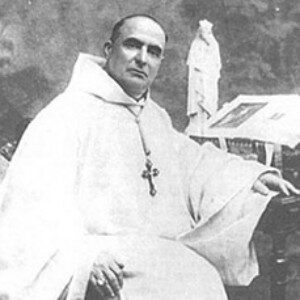The aim of the Incarnation, and, therefore, the aim of every apostolate, is to raise humanity to a divine level. “Christ became man that man might become God.” “The only begotten Son of God, desiring us to be sharers of His Divinity, assumed our nature, in order that having become man, He might make men gods.” Now it is in the Eucharist, or, more accurately, in the Eucharistic life, that is in a substantial inner life, nourished at the divine Banquet, that the apostle assimilates the divine life. We have Our Lord’s own words. They are absolutely clear, and leave no room for equivocation: “Unless you eat the flesh of the Son of man and drink His blood, you shall not have life in you.” The Eucharistic life is simply the life of Our Lord in us, not only by the indispensable state of grace, but also by the superabundance of His action. “I am come that they may have life, and have it more abundantly.” If the apostle is going to overflow with divine life and pour it out upon the faithful, and if the richest source for divine life he can find is the Eucharist, how can we get away from the conclusion that his works will have little efficacy except through the action of the Eucharist on those who are to be, either directly or indirectly, dispensers of that life through these works.
It is impossible to meditate upon the consequences of the dogma of the Real Presence, of the Sacrifice of the Altar, and of Communion without being led to the conclusion that Our Lord wanted to institute this Sacrament in order to make it the center of all action, of all loyal idealism, of every apostolate that could be of any real use to the Church. If our whole Redemption gravitates about Calvary, all the graces of the mystery flow down upon us from the Altar. And the gospel worker who does not draw all his life from the Altar utters only a word that is dead, a word that cannot save souls, because it comes from a heart that is not sufficiently steeped in the Precious Blood.
It was not without a profound purpose that Our Lord uttered the parable of the vine and the branches, right after the Last Supper, in order to bring out with emphasis and precision how useless it would be for men to attempt any active ministry without basing it upon the interior life. “As the branch cannot bear fruit itself . . . so neither can you, unless you abide in Me.” But He goes on at once to show how powerful will be the action of an apostle who lives by the interior, Eucharistic life. “He that abideth in Me, and I in him, the same beareth much fruit.” The same, but he alone. God exercises His powerful action through him, not through others. The reason is, says St. Athanasius, “we are made gods by the flesh of Christ.” When a preacher or catechist retains in himself the warm life of the Precious Blood, when his heart is consumed with the fire that consumes the Eucharistic Heart of Jesus, what life his words will have: they will burn, they will be living flames! And what effects the Eucharist will have, radiating throughout a class for instance, or through a hospital ward, or in a club, and so on, when the ones God has chosen to work there have nourished their zeal in Holy Communion, and have become Christ-bearers!
Love is made perfect by the Eucharist. This living memorial of the Passion revives the divine fire in the soul of the apostle when it seems on the point of going out. It makes him relive Gethsemani, the scene in the Pretorium, Calvary, and teaches him the science of sorrow and humiliation. The apostolic worker will then be able to speak to the afflicted in a language that will make them share the consolations he has drawn from this sublime source.
He speaks the language of the virtues of which Jesus is the only exemplar, because every one of his words is like a drop of the Eucharistic Blood falling upon souls. But for this reflection of the Eucharistic life the active worker will produce no other effect, by his words, than a passing enthusiasm. It will be merely a matter of captivating the secondary faculties, and occupying the outworks of the fortress. But the stronghold itself, that is the heart, the will, will generally remain impregnable.
The efficacy of an apostolate almost invariably corresponds to the degree of Eucharistic life acquired by a soul. Indeed, the sure sign of a successful apostolate is when it makes souls thirst for frequent and fruitful participation in the divine Banquet. And this result will never be obtained except in proportion as the apostle himself really makes Jesus in the Blessed Sacrament the source and center of his life.
This article is taken from a chapter in The Soul of the Apostolate by Fr. Jean-Baptiste Chautard, which is available from TAN Books.









